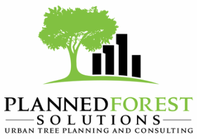TREE SELECTION
There are many factors to consider when selecting a tree to plant in your yard. Below are the four that I think are most important:
1. Soil
Soil is probably the most important factor in determining if a tree will survive planting, become established and grow to maturity. Many aspects of tree health are determined by the soil in which it grows. It is much easier to select a tree suited to the soil you have than to try to adjust the soil to a certain species. Doing so ranges from difficult to impossible, and effects are generally temporary. Is it clay? Sand? Loam? Cement? Bricks? You may want to consider sending in a sample to a local lab if you want a detailed analysis.
(Not so) high quality soil is often what urban trees are forced to grow in. Especially in Chicago, where it is tough to dig a planting hole without unearthing some sort of debris.
2. Tree goals
If you are planting a tree, you are likely doing so with some sort of benefit in mind. Do you want shade? Wildlife attraction? Fruit to eat? Home energy savings? Improved property value?
A good question to ask is: what is missing in my yard that could be at least be partially provided by a mature tree? But remember, trees give back MANY more benefits if they are able to grow to maturity. For a good overview of urban tree benefits, check out the website for the Friends of the Urban Forest.
3. Growing space
What is important here is the mature size of the tree, as stated above. Make sure you consider the tree's crown as well as its base. Will the tree's mature root system have room?
And remember to look up. You don't want to plant a tall-growing tree under utility lines.
4. Maintenance
Some trees will require more water than others. Some have leaves that can be a pain in the fall. Roots of some species are more prone to lift sidewalks or enter basement walls. Do you want to grow grass/shrubs/perennials under the tree but future shade will require heavy pruning?
These are just a few factors that can cause maintenance issues years down the line. Make sure you take these and others into consideration.
1. Soil
Soil is probably the most important factor in determining if a tree will survive planting, become established and grow to maturity. Many aspects of tree health are determined by the soil in which it grows. It is much easier to select a tree suited to the soil you have than to try to adjust the soil to a certain species. Doing so ranges from difficult to impossible, and effects are generally temporary. Is it clay? Sand? Loam? Cement? Bricks? You may want to consider sending in a sample to a local lab if you want a detailed analysis.
(Not so) high quality soil is often what urban trees are forced to grow in. Especially in Chicago, where it is tough to dig a planting hole without unearthing some sort of debris.
2. Tree goals
If you are planting a tree, you are likely doing so with some sort of benefit in mind. Do you want shade? Wildlife attraction? Fruit to eat? Home energy savings? Improved property value?
A good question to ask is: what is missing in my yard that could be at least be partially provided by a mature tree? But remember, trees give back MANY more benefits if they are able to grow to maturity. For a good overview of urban tree benefits, check out the website for the Friends of the Urban Forest.
3. Growing space
What is important here is the mature size of the tree, as stated above. Make sure you consider the tree's crown as well as its base. Will the tree's mature root system have room?
And remember to look up. You don't want to plant a tall-growing tree under utility lines.
4. Maintenance
Some trees will require more water than others. Some have leaves that can be a pain in the fall. Roots of some species are more prone to lift sidewalks or enter basement walls. Do you want to grow grass/shrubs/perennials under the tree but future shade will require heavy pruning?
These are just a few factors that can cause maintenance issues years down the line. Make sure you take these and others into consideration.
